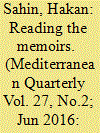| Srl | Item |
| 1 |
ID:
146830


|
|
|
|
|
| Summary/Abstract |
The military’s attitude toward the political realm is problematic in Turkey. While, on the one hand, it accepts the notion of civilian control, on the other hand, it has sometimes exercised tutelary functions or overtly intervened in politics. This essay argues that political thoughts of soldiers have an explanatory power in understanding this dilemma. It examines a set of more than 150 life narratives written by soldiers. Memoirs, autobiographies, and journals are relatively convenient means through which to explain one’s personal thoughts. An elaboration on those texts suggests that soldiers have an ambivalent perception of the political realm, and this serves as a basis for the legitimization of their political actions. The implicit idea that they are the ultimate guardians of the country is embedded in the fact that they are respectful of democracy and are in favor of civilian control in their discourses.
|
|
|
|
|
|
|
|
|
|
|
|
|
|
|
|
| 2 |
ID:
164571


|
|
|
|
|
| Summary/Abstract |
This essay attempts to elucidate the transformation of civil-military relations in Turkey since the failed coup of 15 July 2016. After presenting an overview of these relations prior to the coup, the essay focuses on emerging aspects of them in the postcoup environment and attempts to analyze a pattern. It argues that while a harsh domination has been established over the military by civilian politicians through massive efforts in structural, educational, and legislative domains, those efforts are far from being overarching. Whether it has produced a democratic form of civil-military relations and an irreversible transformation in the mindsets of officer corps is dubious.
|
|
|
|
|
|
|
|
|
|
|
|
|
|
|
|